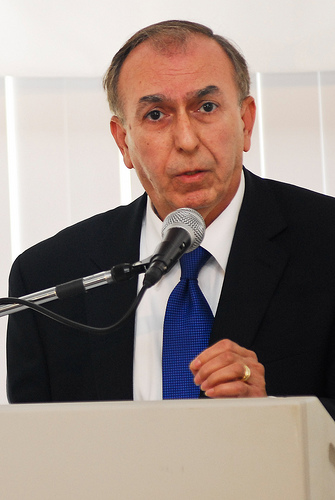Prohibition of Interest in Islamic Banking and Finance
Primary tabs
Since the early 70s, Islamic economics was introduced to world of finance as a new instrument, whose purpose was to follow an economic system based on Islamic Shari'a or the law of Islam. One of the main elements of the system is the prohibition on interest rates.

Islamic economics is referred to as the application of Islamic Shari’a law in economic activity. This form of economics has attracted banks and financial institutions in more than 56 countries including Europe and the United States; they cater to customers who want to invest in a halal instrument, or according to Islamic teachings.
Muslim authors state that Islam offers solutions to solve problems of human civilization. They view the financial problems facing developed countries in Africa and Asia are caused by interest-based financial instruments which create “unrepayable debt†says Muhammad Ayub, author of Understanding Islamic Finance. Mr. Ayub goes on to say that interest-based system makes “a class of people richer and leaving others poorer and oppressed.â€
Suppose you deposit in a conventional bank $1000, at 4 percent interest for a period of one year. At the end of the year, your return is predetermined at $1000+40. The bank will invest your money. If it fell short of $1040, the bank will incur a loss. So an interest-based loan places the risk entirely on the borrower, in this case, the bank. Under Islamic economics, this type of investment is prohibited and is considered “un-Islamic†and “unfair.â€
The source of prohibition of interest is based on the Qur’an. Verse 2:275 reads: “. . .Allah permits commerce and prohibits riba. . .†The etymology of the term riba comes from Aramaic raba meaning ‘increase’. Muslim interpreters define this term as ‘interest’. In pre-Islamic Arabia, a borrower saw his debt double following a default and redouble if he defaulted again. If the borrower was unable to pay off his debt, he would be pushed into enslavement until the debt is paid. Such a situation was creating a social disharmony in Arabia, to which the Qur’an was responding. The ban on riba was therefore an instrument used to avoid mistreatment of fellow citizens, when their financial situation was in distress.
Among the Muslim community in the Middle East and elsewhere, financial transactions involving interest on borrowed money are accomplished, but without mentioning the word ‘interest’. For example, Y wants to borrow from X $500 at 5 percent interest without violating the prohibition. X buys a TV system from Y for $500 but then promptly returns it for $525, payable in one year installments. The additional $25 represents interest but was not mentioned; it was circumvented instead by the purchase of the TV and selling it, immediately, to the borrower at a higher price, which is equivalent to the amount of interest.
The most popular instrument in Islamic banking is Murabaha, a contract of sale in which a commodity is sold for a profit. The contract involves the purchase of real property by the financial institution which then sells them to the client at an agreed mark-up. A repayment is usually in installments. Accordingly, X wants to buy a car from the dealer and finance the transaction through a bank. Under Islamic economics, the bank does not charge interest. So the bank will buy the car on behalf of the buyer, and immediately sells it to X at the dealer’s price plus an extra amount of money for the time spent and the paperwork involved to finalize the deal, the extra amount represents interest on the borrowed money, but the contract does not use the word ‘interest’.
All Muslim authors and practitioners of Islamic finance agree that charging interest is a violation to Islamic Shari’a, but there is no agreement on the definition of ‘interest-free’ loan. There is no account for the rate of inflation in this Islamic instrument. In order to protect the purchasing power of money, loans are indexed to the rate of inflation, which is absent from Islamic banking and was proclaimed un-Islamic in two international conferences on indexation, one held in Islamabad in 1986 and the other in Jeddah in 1987.
Critics of interest-free banking claim that those who call for prohibition on interest are guilty of misinterpreting the Qur’an and misreading Islamic history. The Qur’an bans, not interest rate, but usury, or exorbitant interest.
Suleyman Uldag, a prominent Turkish author suggests that “even if interest were unlawful, it would be a lesser sin to deal in interest openly than to cloak it in practices aimed at deception.†He writes that “Islamic banking is its own worst enemy.â€
Another attack on the prohibition of interest came in 1989 through a fatwa (Islamic legal opinion) from Muhammad Sayyid Tantawi, the grand mufti of Egypt and head of the top Islamic university, al-Azhar, who said that simple bank interest is permissible in Islam, while excessive interest rates constitute riba (usury) and thus forbidden. Tantawi added that legitimate instruments, including high-yield government bonds and interest-bearing saving accounts are compatible with Islamic Shari’a. Tantawi’s fatwa represented the minority view, and provoked considerable discussion among the Muslim community in Egypt and around the world.
Gabriel Sawma is a lawyer with Middle background. Professor at Fairleigh Dickinson University. Consultant on Islamic finance for Laureate Education, Inc. Expert consultant on Islamic divorce in U.S. courts. Author of “The Qur’an: Misinterpreted, Mistranslated, and Misread; the Aramaic Language of the Qur’an.†http://www.syriacaramaicquran.com
editor of International Law blog at http://www.gabrielsawma.blogspot.com
Email: gabrielsawma@yahoo.com. Tel. (609) 915-2237
While every effort has been made to ensure the accuracy of this publication, it is not intended to provide legal advice as individual situations will differ and should be discussed with an expert and/or lawyer. For specific technical or legal advice on the information provided and related topics, please contact the author.









